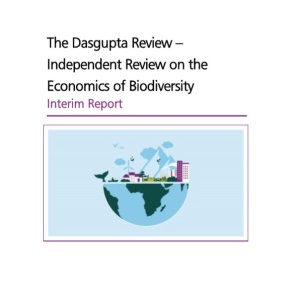
This interim report from the Dasgupta review on the economics of biodiversity, commissioned by the UK’s HM Treasury, sets out the main economic and scientific concepts that will inform the final review. The aim of the review is to assess the economic benefits of biodiversity, and the economic costs of its loss. It will also identify actions that can protect and enhance both biodiversity and economic prosperity.
Points made in the interim report include:
- Ecosystems can be viewed as assets, i.e. durable objects that provide valuable goods and services over their lifetime, which can be infinite if the ecosystems are able to regenerate.
- The value of natural capital - such as ecosystems - can depreciate over time if humanity extracts resources from it more rapidly that it can regenerate.
- Biodiversity itself is not an asset, but is a descriptive feature of ecosystems, which are (in this framework) assets.
- “Investment” in biodiversity can be passive, e.g. simply waiting for an ecosystem to regrow or recover. This is in contrast to conventional economic views of investment, which see investment as necessarily active, e.g. building a road.
- Average income and life expectancy have risen over the last few decades, with only 10% of the world’s population living in absolute poverty in 2018 compared to nearly 60% in 1970. This has come at a cost: our demand for goods and services from the biosphere have overshot its capacity to supply them sustainably.
- The economy is embedded within the biosphere, and the economy can only be sustainable if its ecological footprint is less than the biosphere’s rate of regeneration, as illustrated in the figure below.

Read the full report, Interim Report – The Dasgupta Review: Independent Review on the Economics of Biodiversity, here. See also the Foodsource resource How do food systems affect land-use and biodiversity?







Post a new comment »